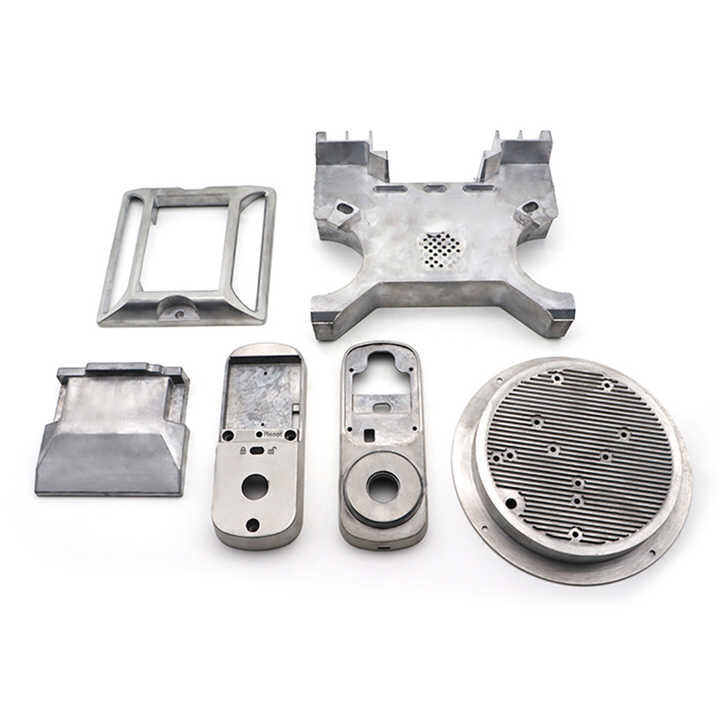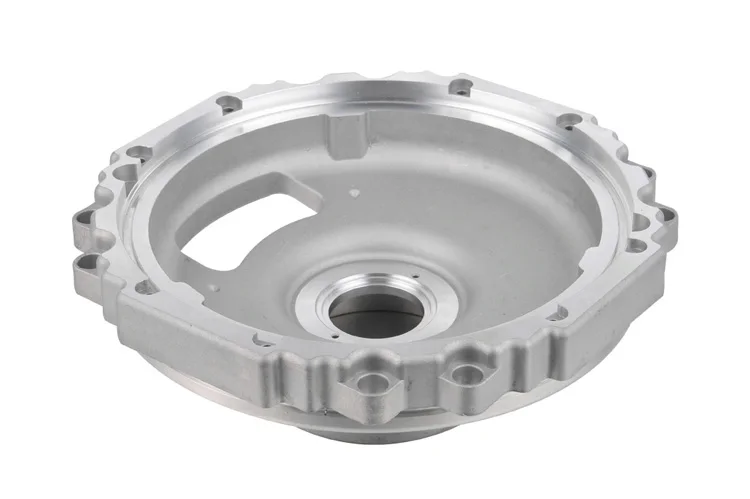The Future of Light Weight Aluminum Foundries: Fads and Innovations Shaping the Sector
The light weight aluminum foundry market is undertaking significant transformation. Trick fads highlight the relevance of sustainability and effectiveness. Advancements in smart production and automation are becoming widespread. Foundries are significantly concentrated on making use of recycled materials. This change raises inquiries about future methods and technologies. How will these changes influence production methods and market dynamics? The responses may redefine the industry landscape in unforeseen ways.
Developments in Smart Production Technologies
As the aluminum foundry sector progresses, advancements in smart production modern technologies are becoming increasingly crucial for boosting productivity and efficiency. The integration of automation, synthetic intelligence, and the Web of Things (IoT) is transforming conventional foundry procedures. These technologies allow real-time surveillance of procedures, enabling immediate modifications that enhance outcome and decrease waste.
Equipment learning algorithms examine manufacturing information to determine patterns and predict upkeep demands, reducing downtime. Robotics are progressively utilized for repetitive jobs, freeing experienced workers to focus on even more complex obstacles. Furthermore, electronic twins-- online versions of physical processes-- assist in simulations that can improve design and operational techniques.
The adoption of these smart manufacturing innovations is driving competitive benefits in the light weight aluminum shop sector. By simplifying workflows and boosting decision-making abilities, foundries can fulfill growing market demands while keeping top notch requirements. The future of aluminum shops is undeniably connected to these technological advancements.
Welcoming Eco-Friendly Products and Processes
The light weight aluminum foundry market is increasingly concentrating on environmentally friendly products and processes to boost sustainability. This shift consists of the adoption of lasting product sourcing, energy-efficient manufacturing techniques, and efficient recycling and waste monitoring techniques. By integrating these practices, shops aim to lower their environmental effect while preserving competition out there.
Lasting Product Sourcing
Just how can light weight aluminum foundries improve their sustainability initiatives? Lasting material sourcing has arised as an important technique in accomplishing this objective. By focusing on recycled aluminum, foundries can greatly lower their environmental footprint, as recycled products require less energy and fewer resources contrasted to key light weight aluminum production. Furthermore, sourcing products from licensed suppliers who follow green techniques promotes liable mining and minimizes eco-friendly impact. Foundries are additionally checking out alternative materials, such as biopolymers and green finishings, to match conventional light weight aluminum processes. Collaborating with stakeholders, including suppliers and environmental companies, cultivates innovation in sourcing methods. Eventually, embracing lasting material sourcing not only aligns with international sustainability objectives however likewise settings light weight aluminum shops as leaders in eco responsible manufacturing.
Energy-Efficient Manufacturing Strategies
Light weight aluminum foundries are increasingly embracing energy-efficient production methods to complement their lasting product sourcing efforts. These techniques concentrate on decreasing energy intake throughout the production process. Advanced technologies, such as induction melting and maximized casting procedures, are being applied to lower the general carbon impact. Furthermore, automation and clever manufacturing systems boost operational performance, enabling far better energy administration. Shops are likewise discovering the integration of eco-friendly energy sources, such as solar and wind, to power their procedures. By focusing on energy effectiveness, aluminum shops not only lower manufacturing costs however also straighten themselves with worldwide sustainability objectives, making sure a more ecologically responsible technique to aluminum manufacturing while fulfilling the rising need for environment-friendly methods in the industry.
Reusing and Waste Management
Accepting environmentally friendly materials and processes, light weight aluminum foundries are prioritizing recycling and waste administration approaches to improve sustainability in their operations. By integrating closed-loop systems, these centers are lessening waste and making the most of source efficiency. Scrap aluminum, a readily offered material, is being reused on-site, substantially lowering the demand for virgin products and reducing energy consumption. Developments in arranging and refining modern technologies even more promote the recycling of light weight aluminum, guaranteeing that even polluted products can be repurposed efficiently. Furthermore, shops are taking on lasting methods such as lowering contaminated materials and promoting the use of biodegradable materials for product packaging. This dedication to reusing not just reduces ecological effect however likewise enhances the economic feasibility of light weight aluminum foundries in an open market.
The Role of Automation and Robotics
Automation and robotics are increasingly changing the light weight aluminum factory market, significantly enhancing production performance. By incorporating advanced innovations, foundries can lower labor expenses while at the same time improving safety and security requirements for their labor force. This shift not just enhances operations however also places the market for sustainable growth in an open market.
Improved Production Performance
Changing manufacturing processes, the combination of sophisticated robotics and automation modern technologies has become a keystone for aluminum shops looking for improved effectiveness. These advancements streamline operations, decrease cycle times, and improve product quality by minimizing human mistake. Automated systems can check production lines in real-time, enabling instant changes that enhance result. On top of that, robotics assist in the handling of dangerous products, guaranteeing more secure working atmospheres while increasing throughput. Predictive upkeep technologies additionally add to performance by anticipating tools failures, thereby minimizing downtime. As a result, light weight aluminum shops can attain higher consistency in their items while reacting a lot more quickly to market needs. This welcome of automation is establishing a new standard for efficiency and functional quality within the market.

Decreasing Labor Costs
The shift in the direction of progressed robotics and automation in light weight aluminum shops not just improves manufacturing performance yet additionally plays a significant role in reducing labor prices. By integrating automated systems, factories can decrease the dependence on hand-operated labor, which usually entails high incomes and training costs. Robotics enhance repeated jobs such as putting, molding, and ending up, permitting a greater output with fewer employees. This technical modification not just minimizes labor-related costs but likewise improves uniformity and high quality in production. In addition, automation can operate around the clock, making the most of operational hours without the associated prices of overtime or shift differentials. As a result, light weight aluminum shops can accomplish considerable savings while maintaining affordable pricing in an evolving market landscape.
Improving Safety And Security Specifications
While conventional light weight aluminum foundry procedures typically expose employees to hazardous settings, the combination of robotics and automation substantially boosts security criteria within the sector. Automated systems can carry out risky tasks, such as molten steel handling and heavy training, lowering human direct exposure to harmful conditions. Furthermore, robotics can operate in poisonous ambiences and severe temperatures, effectively decreasing the risk of injury. Advanced monitoring innovations and expert system assurance real-time safety and security analyses, permitting immediate feedbacks to prospective hazards. Automation streamlines process, decreasing the likelihood of crashes caused by human error. Because of this, the adoption of these innovations not just enhances safety and security yet additionally cultivates an extra efficient and productive functioning setting in light weight aluminum shops.
Enhancing Power Effectiveness in Manufacturing
As aluminum foundries seek to keep competitiveness in a developing market, improving energy efficiency in manufacturing has actually emerged as a critical emphasis. By adopting sophisticated modern technologies such as high-efficiency melting heaters and automated temperature level controls, shops can notably decrease see page power intake. Carrying out real-time tracking systems enables for precise monitoring of energy use throughout the manufacturing process, enabling fast modifications to optimize performance.
Additionally, changing to alternative power sources, consisting of renewable alternatives, can additionally decrease the carbon impact. The combination of energy recuperation systems, which reclaim waste warmth for reuse, is ending up being progressively usual. Training personnel in energy management techniques guarantees that every person associated with the manufacturing process bears in mind power usage.
These efforts not just reduced operational prices however also align with worldwide sustainability goals, placing light weight aluminum factories as liable players in the sector while enhancing their overall competitiveness. - Precision aluminum casting
Developments in Recycling Aluminum
Advancements in reusing light weight aluminum have gotten momentum alongside initiatives to improve power performance in manufacturing. The light weight aluminum sector has actually embraced advanced modern technologies that enhance the recycling process, reducing power consumption and environmental effect. Methods such as hydrometallurgy and new sorting modern technologies improve the extraction of aluminum from scrap, improving yield rates and making sure better recycled material.
The advancement of closed-loop recycling systems allows factories to reuse aluminum without considerable degradation in quality, making the procedure a lot more sustainable. Developments in logistics and collection, consisting of improved tracking systems and automated sorting, have actually additionally played an important role in increasing the efficiency of light weight aluminum recovery. These innovations not just add to a round economy but also help reduce the carbon footprint connected with light weight aluminum production. As the need for lasting practices grows, these technologies place the aluminum factory industry as a leader in responsible source management.
Reacting To Market Needs and Customer Trends
Flexibility has actually come to be a foundation for aluminum foundries responding to advancing market needs and consumer trends. As markets increasingly prioritize sustainability, aluminum shops are shifting in the direction of eco-friendly methods, consisting of enhanced recycling processes and lowered carbon footprints. This shift aligns with consumer preferences for ecologically responsible products, driving shops to introduce their offerings.
Furthermore, the increase of light-weight products in aerospace and automobile markets demands innovations in aluminum alloys and casting methods. Factories are purchasing r & d to generate high-strength, light-weight components that meet rigorous performance requirements.
In addition, customization has actually obtained grip, with customers seeking tailored services. Light weight aluminum shops are leveraging sophisticated production innovations, such as 3D printing, to suit specific client demands efficiently. This responsiveness not only pleases consumer needs but additionally settings aluminum factories competitively in a vibrant market landscape, ensuring their significance in an ever-changing industrial environment.

Frequently Asked Concerns
Just How Do Aluminum Foundries Influence Citizen Economies?
Light weight aluminum shops significantly impact neighborhood economic situations by developing work, stimulating need for regional suppliers, and adding to neighborhood development. Their procedures frequently cause boosted tax earnings, which can fund necessary civil services and framework enhancements.
What Are the Safety Regulations for Light Weight Aluminum Foundry Employees?
Safety and security regulations for light weight aluminum foundry employees consist of necessary individual protective devices, proper air flow systems, routine training on hazardous materials, and adherence to guidelines established by job-related health and wellness and safety and security managements to minimize dangers and guarantee employee security. - aluminum casting
How Does Aluminum Recycling Affect Global Supply Chains?
Light weight aluminum recycling considerably minimizes demand for basic materials, boosts resource performance, and maintains rates. This shift effects worldwide supply chains by cultivating a circular economy, promoting sustainability, and making certain an extra durable sector in rising and fall markets.
What Occupation Opportunities Exist in the Aluminum Foundry Sector?
Different career chances exist in the light weight aluminum shop market, including roles in design, quality assurance, production administration, and research and growth. Skilled labor settings such as mold and mildew manufacturers and maker drivers are also in need.
How Do International Trade Policies Impact Aluminum Foundries?
International profession policies significantly influence aluminum foundries by impacting import tolls, supply chain dynamics, and market accessibility. These variables can influence functional expenses, competition, and total success within the international aluminum production landscape.
By focusing on recycled aluminum, factories can significantly minimize their ecological impact, as recycled products require less energy and fewer resources contrasted to key light weight aluminum manufacturing. Aluminum shops are increasingly adopting energy-efficient manufacturing techniques to enhance their read review lasting material sourcing campaigns. Automation and robotics are increasingly changing the light weight aluminum shop market, significantly improving production efficiency. The shift in the direction of progressed robotics and automation in aluminum factories not just boosts production effectiveness however additionally plays a significant function browse this site in lowering labor prices. As light weight aluminum factories look for to preserve competition in a progressing market, improving energy efficiency in production has actually arised as a crucial focus.